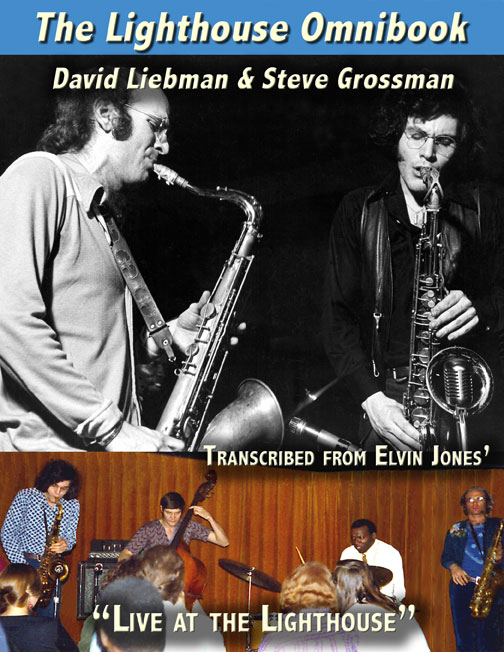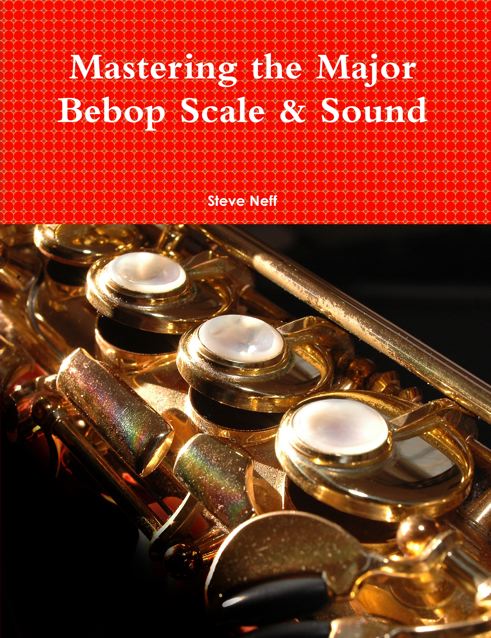Today’s review is about a great transcription book by Petter Wettre entitled “The Lighthouse Omnibook”. This book has been sitting on my shelf for a few years but I was reminded of it the other day when John Greiner (a great tenor player that I played with at Berklee in different ensembles) mentioned the recording Elvin Jones “Live at the Lighthouse” on the SOTW forum. I immediately thought of this great book sitting on my shelf so I thought I would do a review of it.
In 1987, I decided I wanted to transfer from my college in Ithaca NY and go to Boston to study at Berklee. Two things sparked this need for me to transfer.
1.) We had started a little combo in Ithaca and were playing jazz in a local club when a guy asked to sit in with our little group. I don’t remember his name and have no idea who he was but I know he said he had gone to school or was going to school in Boston. This tenor player played over the standards like nothing I had ever heard before. I had no idea what his lines were or how the heck he was navigating through the chords. Half the time he didn’t even sound like he was playing the changes but just playing crazy lines as he soared high above them. It sounded amazing to me……..I thought “Maybe I should go to Boston!”
2.) Later that next summer, I came out to stay my high school girlfriend who was living in Boston and going to Berklee as a singer. While there for the summer, I went to a bunch of recitals and student concerts. I was blown away! I remember seeing a young Donny McCaslin playing in the performance center with Warren Hill and I was hooked. These guys were a few years older than me but they were playing stuff I just had to learn. I also saw George Garzone and Jerry Bergonzi playing a few times that summer which totally blew my mind even more. I had to come to Boston!
The Lighthouse Omnibook-Dave Liebman & Steve Grossman
After arriving at Berklee that fall, I got down to business. What I wanted to learn, what I needed to learn wasn’t anything I could learn in the classroom. What I had to figure out was what were these lines and sounds I was hearing that made no sense to me. One day I was talking to a burnin’ guitar player friend who was talking about Elvin Jones’s album “Live at the Lighthouse” like it was the holy grail. I asked what it was and he just looked at me as if I had asked the dumbest question ever asked. “Dude, you really need to get your act together and listen to that album! Where have you been?” I went to Tower records the next day and got it.
What makes “Live at the Lighthouse” so great is that it is an intense post-Coltrane example of where Coltrane lines and harmonic ideas could go next. This record was recorded in the early 70’s and the energy and intensity is just ridiculous. I had never heard a recording like that before and the energy was a new experience for me. The album features Dave Liebman and Steve Grossman on saxophones. What I heard in this recording were the sounds and type of lines that I heard when that sax player sat in with our group in Ithaca, NY. They were the type of lines I heard in Boston when I would hear Bergonzi or Garzone playing. I had to figure out what these lines were!
Up to this point in my life, I had studied a lot of Charlie Parker, Phil Woods and Dave Sanborn as I was mainly an alto player at the time. Listening to these new types of lines and harmonic ideas opened the doors to a new direction in improvisation for me.
I played “Live at the Lighthouse” over and over for months. I cranked it on my stereo and played along as best I could. Many times not knowing what Steve Grossman or Dave Liebman were playing or why but nonetheless trying to imitate the sound and intensity of what they were playing.
Years later, when I heard that there was a transcription book of the whole “Live at the Lighthouse” album, I freaked out. “WHAT!” “ARE YOU KIDDING ME?” I had to have it and ordered it immediately.
This book is awesome. All the crazy lines from Steve Grossman and Dave Liebman are written out note for note. (although actually playing these lines is another matter) Looking at the book for the first time you start to realize the depth of knowledge used to create these lines. Even though they are all written out, understanding what Liebman or Grossman was actually thinking can be challenging to say the least. The chords changes are also written out which is a huge help also.
As soon as I received the book, I listened to the whole album and marked every line that stuck out to my ears. There are pencil marks all over my book. There are so many great lines made up of altered fingering, overtones, chromaticism, 3 tonic lines, tritone substitutions, and then just sheer craziness that I can’t begin to figure out!
If your interested in The Lighthouse Omnibook you can get it at Jamey Aebersold’s website.
Check out these clips from Live at the Lighthouse below:
Fancy Free
New Breed
Taurus People
*You can find the rest of the album on Youtube. Have fun!




Steve,
Thanks for bringing this album up. I think a lot of younger players out there haven’t even heard about this recording. My experience and thoughts mirror yours, for what it’s worth. This album is without a doubt a “Holy Grail” for tenor players and others. If there was ever a “stranded on a desert island” recording, this is it for me. I equate the “sheer craziness” to sheer genius!
Dammit Steve…..now I’m going to have to buy that book! 😉
Do it! We can compare favorite licks from it!
This had me thinking about an really good article you wrote about how important it was to actually practice improvising and how you had to spend a lot of time just improvising which was something I realized myself, though I never put into words. Experience is a great teacher. I was also thinking it was just as important to spend a lot of time listening to your favorite jazz musicians in order to ingrain the feel of the music into your brain, I mean you have to hear it before you can play it. But you also have to have the passion to play. Learning how to play jazz is no joke, it takes an enormous effort. Not too long ago a trumpet player asked if I would teach him how to play jazz. He’s a working musician, plays in a so-called “blues band”, like most of the stuff you hear if you go to New Orleans. Rock bands really, not that that’s bad. The thing was, though I said I’d teach him, I knew he wouldn’t really commit himself to it because he really wasn’t a jazz freak. If you don’t have the passion for the music you’ll never be serious enough to make that commitment to learn how it’s done.
Rob, Read the book “Grit” by Angela Duckworth. One of the best books on what you are talking about. I’m reading it write now on vacation and it is blowing my mind. All about the “Thing” that actually makes people great. She calls it “grit”. It’s great! I hope to do a blog post on it when I get back. Steve
Steve,
Sounds like a good read, and I will check it out. Enjoy your vacation! I Look forward to your review of the book when you get back.
Hey Steve, I bought the book and reacquainted myself with the music which I have had in my library since it came out. I really love the sound and ideas that these guys come up with, but when I’m just playing a standards gig, I’m not sure a lot of this material can work its way into my playing. Its great playing but for me its really hard to assimilate into my thought process.
I studied and played with Steve Grossman in NY in the early 80’s, He taught me so much. As a young college kid, I recall him saying to me, ” you can play any note over any chord, you just have to know how to make it work.” This comment really surprised me as I was very analytical about playing at that time. I think this book is great and a long time coming. Thnx
Hi Ken, Yes, Garzone told me the same thing when I studied with him at Berklee. It’s a hard concept to grasp when your a young kid that wants to be taught what exactly to play……….